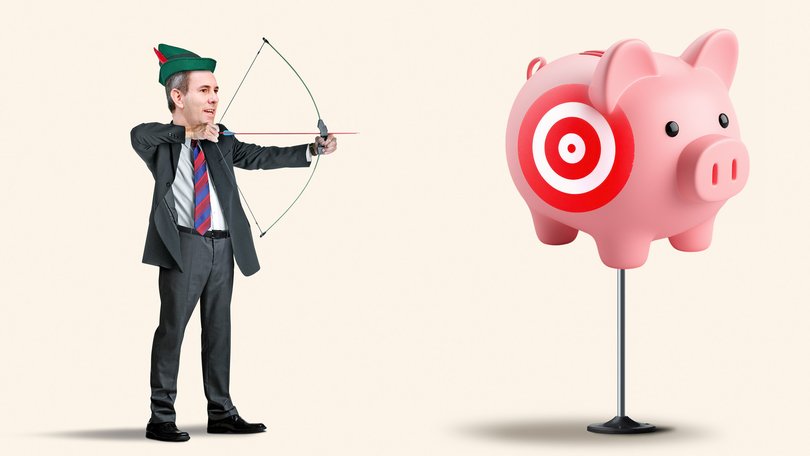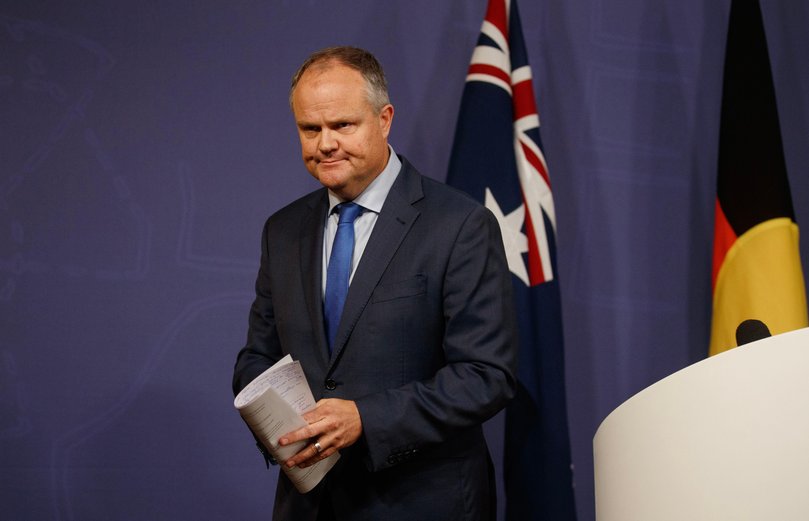Ted O’Brien slams ALP’s Robin Hood act, claiming ‘unfair’ super tax will sting average workers in the end
The Coalition will oppose ‘revenue raising’ scheme as Greens push for $2m change in negotiations with Labor for Senate support

The Coalition has accused Labor of pretending to be “modern day Robin Hoods” as the Government’s new superannuation tax model shapes up to be the first major policy battle of the new term.
Shadow treasurer Ted O’Brien on Thursday confirmed the Coalition would formally oppose the Government over its plan to hike the tax rate from 15 to 30 per cent on the earnings of those whose super balances are above $3 million.
“We will definitely, as a Coalition, oppose this unfair super tax of Labor’s every step of the way. This is grossly unfair, and it flies in the face of everything we believe in as a Coalition,” Mr O’Brien said after the Coalition shadow cabinet made its first collective policy decision since the election.
Sign up to The Nightly's newsletters.
Get the first look at the digital newspaper, curated daily stories and breaking headlines delivered to your inbox.
By continuing you agree to our Terms and Privacy Policy.The position marks an overnight escalation in rhetoric after Mr O’Brien earlier this week labelled the draft legislation “super big and super bad” but also indicated he was open to talks.
“Unfortunately, what we have here in Labor super tax is a series of measures cobbled together,” he said on Thursday.
“One, it’s a tax increase. Two, the taxation of unrealised capital gains . . . to think that a person can make a theoretical profit, no money has hit the bank account, and they get taxed every single year. That’s not fair,” he added.

By refusing to index the taxation policy, Labor was “pretending they’re the modern day Robin Hoods” by taking from “the fat cats with multi-million dollar portfolios to fund the good deeds of government,” he argued.
“Like hell it is. Labor knows full well, by not indexing this, they’re not going to only go after some high wealth individuals,” said Mr O’Brien.
“The average teacher, nurse, tradie, especially the younger you are, you will be hit. You’ll be stung by this tax.”
Labor refutes this claim. The Government says the proposal, which failed to progress through parliament in the last term, would impact about 80,000 Australians, most of them above retirement age.
It would be expected to raise an additional $2.3 billion for Commonwealth coffers in its first year.
The new 30 per cent rate would apply only to the proportion of earnings that are above $3m, but opponents argue it will gradually capture a wider group of earners unless the threshold is indexed, and it will disproportionately affect younger generations.
The Greens are open to a compromise that results in the threshold for the tax change lowered to $2m and indexed, as a solution to the super system becoming “less about providing a dignified retirement for working people, and more of a vehicle for wealth accumulation”.
As Labor and the Greens prepare to begin talks on a compromise to push the tax through, Greens Senator Sarah Hanson-Young signalled the minor party was open to discussing other concessions.

“Negotiations always happen,” she said.
Both Prime Minister Anthony Albanese and Treasurer Jim Chalmers strongly defended the Government’s plans on Thursday.
Dr Chalmers called out “disunity” in the Coalition, “who seem to have different views amongst themselves and different views from day to day” on radio.
He confirmed Labor, which does not have the numbers in the Senate to pass the legislation, would be engaging “respectfully” with the crossbench.
“But our intention, our preference, is to legislate the plan that we announced almost two and a half years ago,” he said.
“We’ve done years of consultation now. We released the legislation in 2023. We released the regulations in March of 2024 it’s been on the parliament’s books for a long time now.”
Critics also point out the policy would go beyond current taxation on “realised” earnings to incorporate “unrealised” increases on the value of assets like property or farms.
On a visit to Melbourne, Mr Albanese refused to be drawn on questions over whether farmers may be forced to sell their property if they were linked to self-managed super funds.
“There’s not anything new here. This has been before the Parliament for about two years,” said Mr Albanese during a visit to Melbourne.
“What we need to do is to make sure that our superannuation system is fair. That is what we are setting about to do.”
But the plan in its current form has caused disquiet in the business community, in particular about entrenching precedents.
“If there is a new tax or extended tax which is being applied to unrealised capital gains, there’s a concern about the precedent that it sets more than any more than anything,” said Andrew McKellar, CEO of the Australian Chamber of Commerce and Industry.
“Our preference is that we don’t see something that is applied on unrealised capital gains, and that, over time, will grow in terms of its impact simply because of because the threshold is not being indexed.”
Mr McKellar said there was concern about the impact on family businesses down the track as well as the prospect of a new wealth tax.
“It’s not a tax reform in its own right. It’s a revenue measure,” he said, arguing in favour of reform to improve the competitiveness of the tax system rather than increase the tax burden.
AMP’s chief economist Shane Oliver said it would be better if the government “came clean” about indexation to avoid any misfires.
The uncertainty in the public’s minds over whether they may be affected could change financial behaviour “which could then have unintended consequences,” including people investing more in residential property than in super, pushing up property prices.
“There are valid concerns from business owners, farmers and startup companies that have often relied on funding from their super funds,” he said.
Nicola Powell, chief of research and economics at Domain, said the proposal, if passed, could affect reshape property investment.
“It’s those unrealised gains that are going to be taxed that are the issue, and particularly if it’s property,” she said.
“You cannot sell part of a property. If you can’t find the cash somewhere, you’ve got to liquidate, which may mean you’ve got to sell off an asset to bring down that overall value,” Ms Powell explained.
“The ripple effects will be, particularly in housing, that if self-managed super funds have to liquidate their assets, that could mean more residential listings for sale and actually fewer rental properties.”

